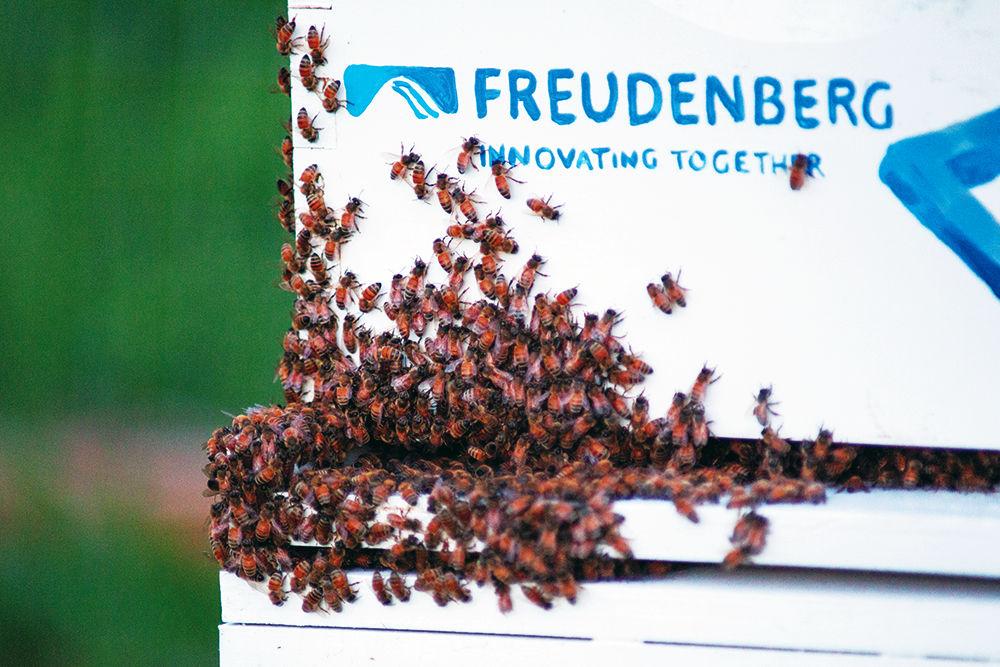On Centennial Campus, off of Main Campus Drive, is a newly created apiary made up from eight honeybee hives that house close to 60,000 bees each. The hives were installed by Bee Downtown, a local bee management company founded and run by NC State alumna, Leigh-Cathryn Bonner, who swears the bees won’t sting as long as you don’t get too close.
Bonnor has been operating her company, Bee Downtown, since her junior year of college. The company installs and maintains bee hives for businesses and cities, which both helps to rebuild the turbulent American bee population and in turn, also creates a green marketing tool for the businesses who sponsor the hives.
“Our mission is truly at the core about education,” Bonner said. “Teaching people in urban areas about agriculture and where food comes from, and getting people to have the ability to experience agriculture on a daily basis in a way that is really fun and inviting.”
Bonner said that her company is often misidentified as a nonprofit because of their altruistic, environmental goals, but that when companies sponsor a hive from her company, they are paying for the installation and maintenance of the hives, as well as tours and, of course, access to the honey produced. Bee Downtown has established apiaries in locations like Rocky Mount Mills, the North Carolina Museum of Art and now Centennial Campus.
The Centennial Apiary, established back in April, is what Bonnor calls a “community apiary.” It is not located on the primary sponsor’s property, but instead on NC State’s campus.
Leah Burton, the director of Centennial Campus Partnerships and Industry Alliances, said that the process of getting the hive on Centennial began last Fall when the campus was contacted by Bandwidth, the apiary’s primary sponsor and a call networking company operating on Centennial Campus. According to Burton, bandwidth houses four to five hundred employees on campus.
“We began talking about different buildings that her hives could go on top off because that was her [Bonner’s] first model — putting her hives on top of buildings in downtown Durham, but the more we talked about it, the more we thought that ‘gosh there’s plenty of other places on campus and maybe some areas that might be a little more accessible to the public,’” Burton said.
Three of the eight honeybee hives are sponsored by Bandwidth. The remaining five are split amongst other sponsors, including the Freudenburg IT company and Andy Albright, a member of the NC State Entrepreneurship Initiative’s advisory board. The NC State Entrepreneurship Initiative also sponsored a hive, as did the Non Profit Institute and the student-run SOUL Garden.
Bonner said that companies who sponsor Bee Downtown hives often tour potential clients at the hives.
“Normally with these sort of meetings, your inside sitting at tables all day and it’s tiring,” Bonner said. “For people to have a break to say ‘hey we’re going to go look at these bee hives, this is why Bandwidth is so cool, they care about the environment, our employees love it and people remember Bandwidth.’ They [clients] remember that meeting compared to other meetings.”
Bonner said that, during peak bee season, one hive can house up to 60,000 bees, but that the majority of the bees stay in the beehive.
“Only the oldest bees go out to leave and forage,” Bonner said. “It’s not like we’ve introduced a million stinging darts to Hunt Library. Bees can fly up to three miles, so they’ll be out there working, not just at Hunt.”
Burton said the partnership is unique in nature because it highlights Centennial Campus’ status as a learning lab, or an ecosystem that, itself, can be studied. Observing how the bees influence the Soul Garden and other various pollinator gardens on Centennial Campus is a good teaching tool, according to Burton.
“After this experience, we are really keen to look for additional opportunities where we can use Centennial Campus as an example for sustainability,” Burton said.







